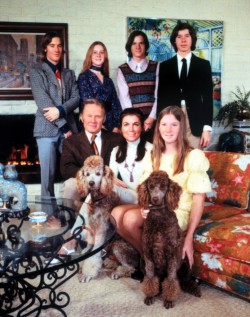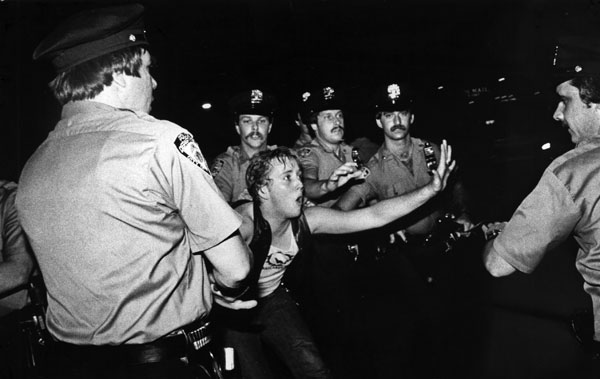PBS gets its gay on (retro-style), revisiting Stonewall and the Louds
 Watching documentaries like The Stonewall Uprising almost always make me feel anger more than Pride. At least at first. That’s because they wisely use old footage of news reports and instructional videos to let you know what the temperament of the nation was at the time. It’s easy to laugh at the outdated ideas about pot in Reefer Madness; it’s quite another to hear Mike Wallace explain how the concept of a “happy homosexual” is insane. After all, it’s a sickness that ruins lives. Like syphilis. “Homosexuals may appear normal” warns one cautionary narrator, but you shouldn’t be fooled.
Watching documentaries like The Stonewall Uprising almost always make me feel anger more than Pride. At least at first. That’s because they wisely use old footage of news reports and instructional videos to let you know what the temperament of the nation was at the time. It’s easy to laugh at the outdated ideas about pot in Reefer Madness; it’s quite another to hear Mike Wallace explain how the concept of a “happy homosexual” is insane. After all, it’s a sickness that ruins lives. Like syphilis. “Homosexuals may appear normal” warns one cautionary narrator, but you shouldn’t be fooled.
It’s angering because we’re not talking about the Dark Ages, but America as recently as the mid-1960s. We still fight myths every day from the right, but it’s dispiriting knowing that, back then, this bigotry was mainstream.
But Pride does wind its way in during this doc, airing this week (and again in June) as part of the American Experience series on PBS, when the queers and queens finally fight back at the Stonewall Inn on a sweltering summer night in 1969. The resulting march — and movement — are still with us.
The filmmakers spend surprisingly little time on the actual uprising (there’s little photographic evidence of it). Rather, they lay the groundwork for the need for gay liberation, culling stories from actual witnesses to the riot (and, most unexpectedly, former NYC Mayor Ed Koch, who has never been very open about being gay). Instead of simply explaining a moment in time, The Stonewall Uprising does something greater: It forces us to reevaluate what Pride is and why we still have, and still need, to march ever so often, and it reminds us how fragile our rights are, and how hard-fought they were by some very heroic gay people.
Less than five years after Stonewall, television had its first openly gay recurring character — and he wasn’t acting. When An American Family aired in 1973, it basically invented what we now call reality TV, following not attention hungry publicity whores like the Kardashians or the Hogans or the Gottis, but an upper middle class Southern California family named the Louds.
Lance Loud was only 20 and living the gay life in New York when the 12-part series first aired, showing Americans a world never seen on TV — and no doubt giving gays in middle America a belief, long before Dan Savage said it, that it does get better.
KERA World will rebroadcast the entire series in two marathons this weekend — something that hasn’t been done in 20 years. Like some of the news shows in The Stonewall Uprising, there are outmoded techniques and assumptions that make it look dated, but if you’ve never seen it, you owe it to yourself to look past the fashions and the cheesy graphics and think instead about how some things haven’t changed (family is still awkward about gay stuff) and some things, mercifully, have.
— Arnold Wayne Jones
The Stonewall Uprising airs on Ch. 13 April 25 at 9 p.m.; An American Family airs on Ch. 13.2 April 24 and again April 25 from 11 a.m.–11 p.m.
















